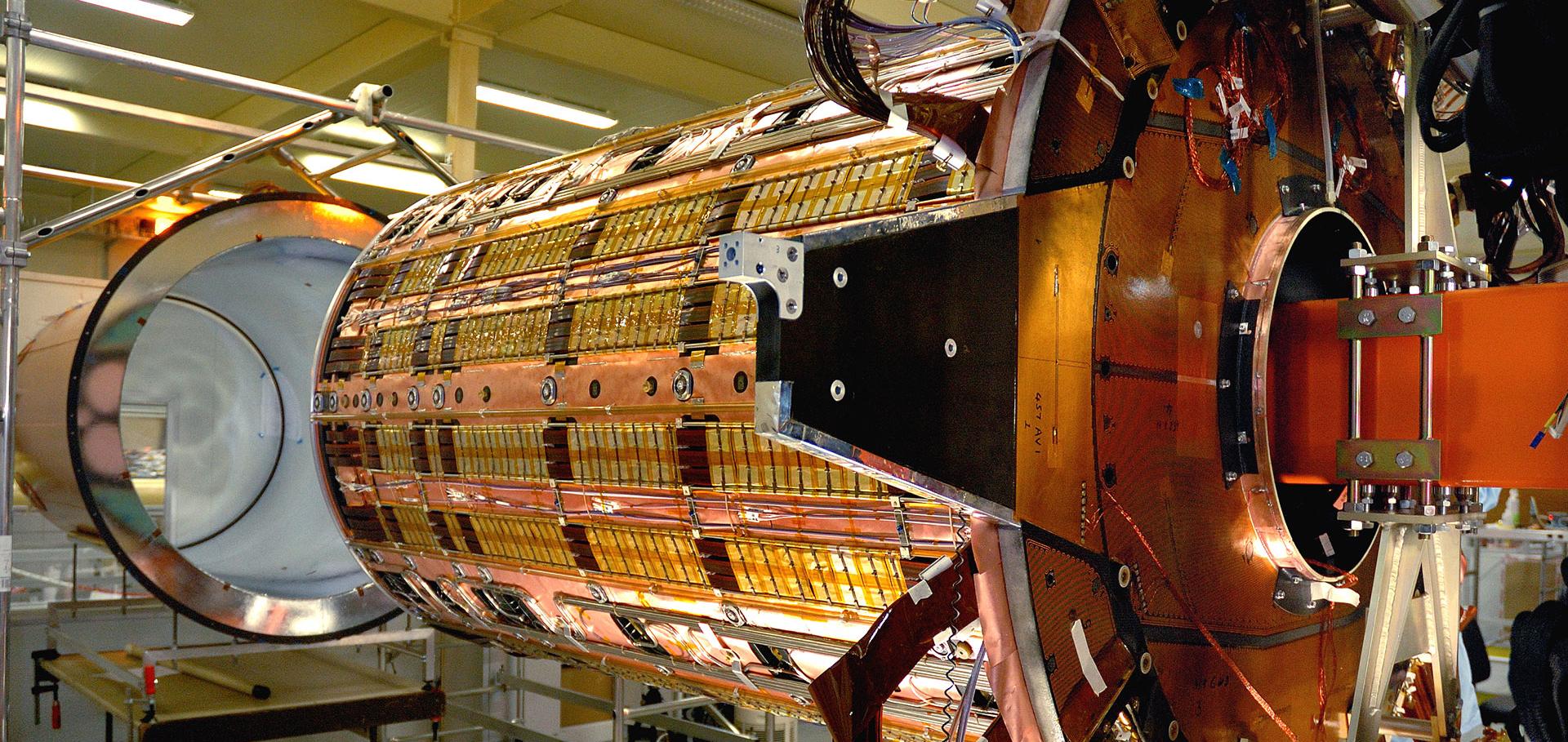Search for Bs0-(Bs0)over-bar oscillations
PHYSICS LETTERS B 414:3-4 (1997) 382-400
Authors:
W Adam, T Adye, I Ajinenko, GD Alekseev, R Alemany, PP Allport, S Almehed, U Amaldi, S Amato, P Andersson, A Andreazza, P Antilogus, WD Apel, Y Arnoud, B Asman, JE Augustin, A Augustinus, P Baillon, P Bambade, F Barao, M Barbi, DY Bardin, G Barker, A Baroncelli, O Barring, MJ Bates, M Battaglia, M Baubillier, J Baudot, KH Becks, M Begalli, P Beilliere, Y Belokopytov, K Belous, AC Benvenuti, C Berat, M Berggren, D Bertini, D Bertrand, M Besancon, F Bianchi, M Bigi, MS Bilenky, P Billoir, MA Bizouard, D Bloch, M Blume, M Bonesini, W Bonivento, M Boonekamp, PSL Booth, AW Borgland, G Borisov, C Bosio, O Botner, E Boudinov, B Bouquet, C Bourdarios, TJV Bowcock, I Bozovic, M Bozzo, P Branchini, KD Brand, T Brenke, RA Brenner, RCA Brown, P Bruckman, JM Brunet, L Bugge, T Buran, T Burgsmueller, P Buschmann, S Cabrera, M Caccia, M Calvi, AJC Rozas, T Camporesi, V Canale, M Canepa, F Carena, L Carroll, C Caso, MVC Gimenez, A Cattai, FR Cavallo, V Chabaud, M Chapkin, P Charpentier, L Chaussard, P Checchia, GA Chelkov, M Chen, R Chierici, P Chliapnikov, P Chochula, V Chorowicz, J Chudoba, V Cindro, P Collins, M Colomer, R Contri, E Cortina, G Cosme, F Cossutti, JH Cowell, HB Crawley, D Crennell, G Crosetti, JC Maestro, S Czellar, J Dahm, B Dalmagne, G Damgaard, PD Dauncey, M Davenport, W Da Silva, A Deghorain, G Della Ricca, P Delpierre, N Demaria, A De Angelis, W De Boer, S De Brabandere, C De Clercq, C De La Vaissiere, B De Lotto, A De Min, L De Paula, H Dijkstra, L Di Ciaccio, A Di Diodato, A Djannati, J Dolbeau, K Doroba, M Dracos, J Drees, KA Drees, M Dris, JD Durand, D Edsall, R Ehret, G Eigen, T Ekelof, G Ekspong, M Elsing, JP Engel, B Erzen, ME Santo, E Falk, G Fanourakis, D Fassouliotis, M Feindt, P Ferrari, A Ferrer, S Fichet, TA Filippas, A Firestone, PA Fischer, H Foeth, E Fokitis, F Fontanelli, F Formenti, B Franek, AG Frodesen, R Fruhwirth, F Fulda-Quenzer, J Fuster, A Galloni, D Gamba, M Gandelman, C Garcia, J Garcia, C Gaspar, U Gasparini, P Gavillet, EN Gazis, D Gele, JP Gerber, L Gerdyukov, R Gokieli, B Golob, P Goncalves, G Gopal, L Gorn, M Gorski, Y Gouz, V Gracco, E Graziani, C Green, A Grefrath, P Gris, G Grosdidier, K Grzelak, M Gunther, J Guy, F Hahn, S Hahn, Z Hajduk, A Hallgren, K Hamacher, FJ Harris, V Hedberg, R Henriques, JJ Hernandez, P Herquet, H Herr, TL Hessing, JM Heuser, E Higon, SO Holmgren, PJ Holt, D Holthuizen, S Hoorelbeke, M Houlden, J Hrubec, K Huet, K Hultqvist, JN Jackson, R Jacobsson, P Jalocha, R Janik, C Jarlskog, G Jarlskog, P Jarry, B Jean-Marie, EK Johansson, L Jonsson, P Jonsson, C Joram, P Juillot, M Kaiser, F Kapusta, K Karafasoulis, E Karvelas, S Katsanevas, EC Katsoufis, R Keranen, Y Khokhlov, BA Khomenko, NN Khovanski, B King, NJ Kjaer, O Klapp, H Klein, P Kluit, D Knoblauch, B Koene, P Kokkinias, M Koratzinos, K Korcyl, V Kostioukhine, C Kourkoumelis, O Kouznetsov, M Krammer, C Kreuter, I Kronkvist, Z Krumstein, W Krupinski, P Kubinec, W Kucewicz, K Kurvinen, C Lacasta, I Laktineh, JW Lamsa, L Lanceri, DW Lane, P Langefeld, JP Laugier, R Lauhakangas, G Leder, F Ledroit, V Lefebure, CK Legan, A Leisos, R Leitner, J Lemonne, G Lenzen, V Lepeltier, T Lesiak, M Lethuillier, J Libby, D Liko, A Lipniacka, I Lippi, B Loerstad, JG Loken, JM Lopez, D Loukas, P Lutz, L Lyons, J Macnaughton, G Maehlum, JR Mahon, A Maio, TGM Malmgren, V Malychev, F Mandl, J Marco, R Marco, B Marechal, M Margoni, JC Marin, C Mariotti, A Markou, C Martinez-Rivero, F Martinez-Vidal, SMI Garcia, J Masik, F Matorras, C Matteuzzi, G Matthiae, M Mazzucato, M Mc Cubbin, R Mc Kay, R Mc Nulty, G Mc Pherson, J Medbo, M Merk, C Meroni, S Meyer, WT Meyer, M Michelotto, E Migliore, L Mirabito, WA Mitaroff, U Mjoernmark, T Moa, R Moeller, K Moenig, MR Monge, P Morettini, H Mueller, K Muenich, M Mulders, LM Mundim, WJ Murray, B Muryn, G Myatt, T Myklebust, F Naraghi, FL Navarria, S Navas, K Nawrocki, P Negri, S Nemecek, W Neumann, N Neumeister, R Nicolaidou, BS Nielsen, M Nieuwenhuizen, V Nikolaenko, M Nikolenko, P Niss, A Nomerotski, A Normand, A Nygren, W Oberschulte-Beckmann, V Obraztsov, AG Olshevski, A Onofre, R Orava, G Orazi, S Ortuno, K Osterberg, A Ouraou, P Paganini, M Paganoni, S Paiano, R Pain, H Palka, TD Papadopoulou, K Papageorgiou, L Pape, C Parkes, F Parodi, U Parzefall, A Passeri, M Pegoraro, L Peralta, H Pernegger, M Pernicka, A Perrotta, C Petridou, A Petrolini, HT Phillips, G Piana, F Pierre, M Pimenta, E Piotto, T Podobnik, O Podobrin, ME Pol, G Polok, P Poropat, V Pozdniakov, P Privitera, N Pukhaeva, A Pullia, D Radojicic, S Ragazzi, H Rahmani, PN Ratoff, AL Read, M Reale, P Rebecchi, NG Redaelli, M Regler, D Reid, R Reinhardt, PB Renton, LK Resvanis, F Richard, J Ridky, G Rinaudo, O Rohne, A Romero, P Ronchese, L Roos, EI Rosenberg, P Rosinsky, P Roudeau, T Rovelli, W Ruckstuhl, V Ruhlmann-Kleider, A Ruiz, K Rybicki, H Saarikko, Y Sacquin, A Sadovsky, G Sajot, J Salt, M Sannino, H Schneider, U Schwickerath, MAE Schyns, G Sciolla, F Scuri, P Seager, Y Sedykh, AM Segar, A Seitz, R Sekulin, L Serbelloni, RC Shellard, A Sheridan, I Siccama, P Siegrist, R Silvestre, F Simonetto, AN Sisakian, TB Skaali, G Smadja, N Smirnov, O Smirnova, GE Smith, O Solovianov, R Sosnowski, D Souza-Santos, T Spassov, E Spiriti, P Sponholz, S Squarcia, D Stampfer, C Stanescu, S Stanic, S Stapnes, I Stavitski, K Stevenson, A Stocchi, J Strauss, R Strub, B Stugu, M Szczekowski, M Szeptycka, T Tabarelli, JP Tavernet, O Tchikilev, F Tegenfeldt, F Terranova, J Thomas, A Tilquin, J Timmermans, LG Tkatchev, T Todorov, S Todorova, DZ Toet, A Tomaradze, B Tome, A Tonazzo, L Tortora, G Transtromer, D Treille, G Tristram, A Trombini, C Troncon, A Tsirou, ML Turluer, IA Tyapkin, M Tyndel, S Tzamarias, B Ueberschaer, O Ullaland, V Uvarov, G Valenti, E Vallazza, GW Van Apeldoorn, P Van Dam, J Van Eldik, A Van Lysebetten, N Vassilopoulos, G Vegni, L Ventura, W Venus, F Verbeure, M Verlato, LS Vertogradov, D Vilanova, P Vincent, L Vitale, E Vlasov, AS Vodopyanov, V Vrba, H Wahlen, C Walck, F Waldner, C Weiser, AM Wetherell, D Wicke, JH Wickens, M Wielers, GR Wilkinson, WSC Williams, M Winter, M Witek, T Wlodek, J Yi, K Yip, O Yushchenko, F Zach, A Zaitsev, A Zalewska, P Zalewski, D Zavrtanik, E Zevgolatakos, NI Zimin, GC Zucchelli, G Zumerle


